On reforestation efforts in Cameroon: “We’re not doing it so we can make guitars; we’re doing it so our grandkids can still make guitars.”
Recently, I had the chance to speak with Taylor Guitar’s Director of Natural Resource Sustainability, Scott Paul. Paul is a renowned environmentalist with over two decades experience in the field, including time with Greenpeace, and a clear vision for how to make the instrument-building business a more sustainable operation, one that not just delivers great guitars to the music world, but one that also does so in a way that uses our Earth’s resources in the most manner possible.
More to the point, we spoke at length about the Ebony Project the company is undertaking in Cameroon, sometimes-confusing CITES regulations, and how the general industry of woodworking and lumber is impacting the environment on a global scale, and efforts being taken to counteract the negative impact humankind has had on its surroundings.
Let’s start in a more general sense. I think there are a lot of misconception about what exactly is going on with woods these days. There’s a lot of chatter about CITES, and certain woods becoming unavailable in certain regions for import. I think it might be helpful to address some of the message-board talk before we delve into specifics with what Taylor is doing.
Sure, let’s set the context for this particular point in history. Stepping way back, musical instrument manufacturers have sourced wood the same way for hundreds of years – by sourcing what was locally available. Either trees that grew locally or wood that was brought in by larger industries like Mahogany and Rosewood. That’s just the way it had always been.
But in the past 15 or 20 years, things have really started to change in terms of the global forest trade and regulation. Where it had always been sort of a frontier mentality, you didn’t have to really think where you were sourcing the wood beyond some middleman wood broker. But that’s all changing, and guitar manufacturers are in many ways the ‘canary in the coal mine,’ who’ll see first differences in quality, price and availability – and we’re seeing that. We’re also seeing, as in 2018, where the United States passed the first laws about amending the Lacey Act, making it illegal to bring in forest products if a crime was committed relating to it in another country.
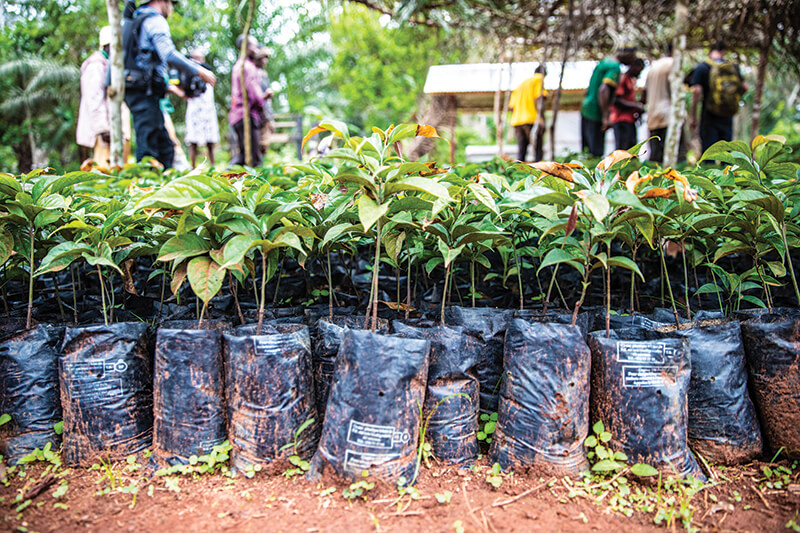
And now CITES is beginning to look more closely at forest products and plants in a more serious way. And one of the things they’re starting to look at is trees, commercially traded trees. And of course, many of those are used to make musical instruments. So, the point of all that backstory is to say that it was always kind of the same until not that long ago, and for a number of reasons, the government reaction to the health of forests has changed. And all these changes are setting up Taylor Guitars, and Bob Taylor specifically, where he’s beginning to spend his personal time and resources doing restoration on various species that he’s relied on for the past 40 years.
I have to imagine these regulations put in place to protect the environment and specifically the forests where these woods are harvested from. And I think where Taylor is leading the way is in that sustainability push especially with its Ebony Project – that’s where the industry should be headed and I know you were personally in Cameroon about a month ago, is that correct?
Yeah, I’m in Cameroon a couple times a year. The reason I was most recently there is that April was the first rainy season so if you’re going to plant a couple thousand plants, that’s when you’re going to do it. So, one aspect of the Ebony Project is preparing for seasonal planting, and that comes with the rains.
Before we jump into that though, it’s important to note that for all of the other species [of wood] besides koa and ebony (where worldwide demand for them outside of the instrument manufacturing industry is just not that strong) like spruce, maple, mahogany, etc., the music industry probably only uses less than 1/10th of 1% of the global trade in any given species.
So, in the grand scheme of things, we might seem super insignificant, but of course that doesn’t alleviate our legal, ethical and moral responsibilities.
The guitar is so visible in our culture, that people must think our industry is responsible for so much destruction…
We’re not the main driver, but maybe because the guitar is so universally beloved, we can be part of a movement to stabilize and restore some of the resources that we’ve long depended on.
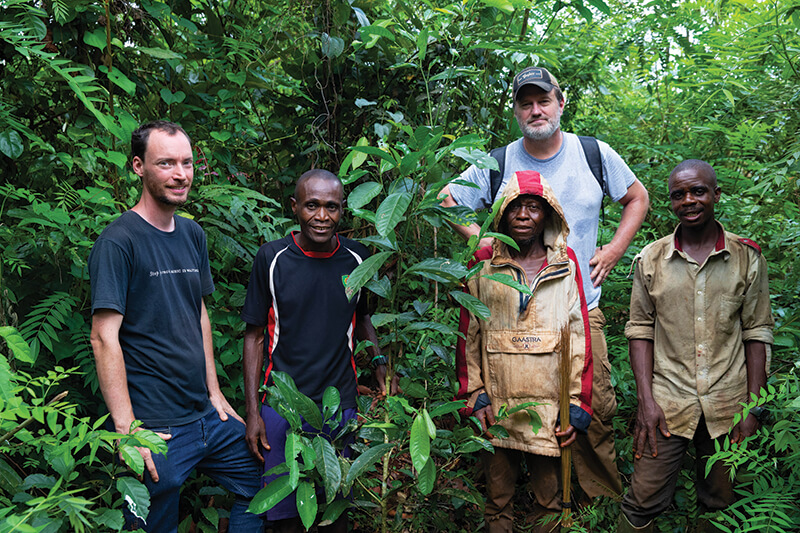
Who is the biggest user of forest resources, then – which industry?
It’s undisputed that the primary driver of forest lost, in particular tropical forest lost, is actually agricultural conversion. It’s palm oil, soybeans, cattle, coffee…The other primary industries for the actual wood usage are furniture manufacturing, home construction, flooring – those continue to be the main consumers of the actual wood produced.
I’d love to talk about ebony more in particular. I have ebony fingerboards on a number of my personal guitars, but my own ignorance about the wood is alarming. I don’t know much about where it typically comes from, how it’s harvested, how it’s exported, and what initiatives are underway to alleviate the environmental losses due to its harvesting.
Ebony has been traded as far back as the Egyptians. It’s got a unique black coloring that has always made it stand out – and it’s uniquely suitable for things like a fingerboard because it’s so hard that if dried properly, it’s not going to crack, and it’s going to hold your frets at the exact same height over time, perfectly.
On the other hand, it’s an absolutely horrible wood to work with [laughs]. There’s a reason why you’ve never seen ebony furniture, for example. The only time you ever see it is small pieces like billiard cues or knife handles, because you can’t manufacture with it easily. So, there’s not a huge market demand for it like rosewood. Taylor purchased Crelicam in 2011 [ed note – Crelicam is a Cameroon-based supplier of ebony] in part because it was a reaction to the US passing new amendments to the Lacey Act, and since the mill was for sale, there was an opportunity for us to take direct responsibility for a wood that we like to use, from a part of the world where it’s not always easy to get transparent information from. So, if we got in trouble, it would be our own damn fault.
So, you were now in charge of the supply chain.
Exactly. That was the dream behind the purchase, that we would do it right, and that we’d do it legally, morally, and ethically. And in 2014, because we were doing a good job, we won the State Department’s Ace Award for corporate excellence overseas.
So fast forward to 2016 – we started asking questions like how much ebony is out there? How does it reproduce? The research told us that the world knew shockingly little about African Ebony. There was just not a lot of information out there.
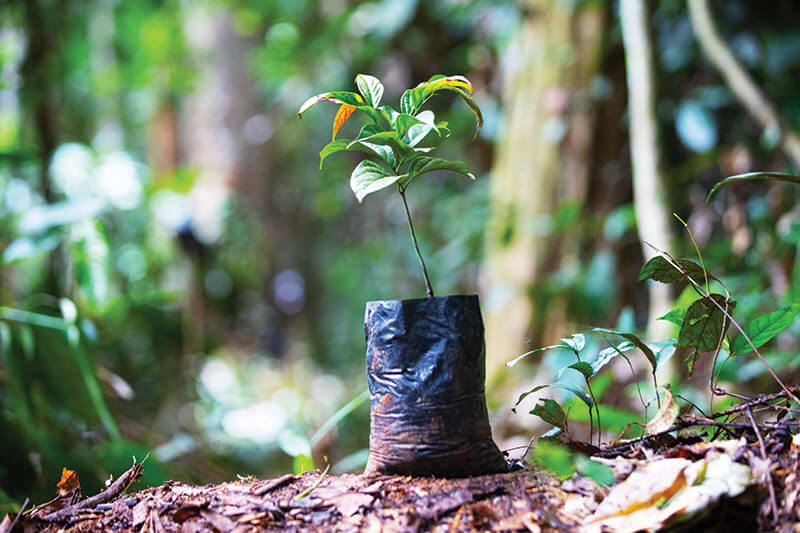
Some other traditional places where people got ebony were Madagascar, which supplied it for a long time, and now you can’t get it from there anymore. There are a lot of problems there, it’s just a tough place for anything. They’ve overexploited their natural resources.
So, Bob Taylor was the very first guy who said, ‘OK, I will fund a project at the Congo Basin Institute, and it’s going to do a few things. For starters, we’re going to study the basic ecology of ebony.’ Up until a year ago, nobody even knew which insects pollinated the ebony flower – things as basic as that. It’s all a testament to Bob’s personal interest in this space. The project works at a village level, by teaching people how to populate the plants and have the highest success rates producing plants by a number of different means.
So, Taylor is really laying the groundwork now that other guitar companies can follow to responsibly source and harvest their own woods around the world, too?
That’s right. And we still occasionally get people on message boards saying that we shouldn’t be using tropical woods at all. And on the one hand, Taylor is doing some great stuff looking at alternative species including urban woods and other supply sources. But I think, in 2019, it’s kind of naïve to be saying you should have [blanket] tropical wood boycotts. We have to make a choice – we are going to collectively value standing forests and the products they can supply, if managed correctly, or we can turn our backs and walk away.
But I’ll tell you – the soybean, and palm oil, and larger agricultural interests [will come in] — it’s not like that land is going to be abandoned, that land is going to be used for something. Now, we’re either going to manage it as forests, or it’s going to be converted to something else. I know the response to this argument is that our track record [as a society] over the past few hundred years is nothing to be proud of. Not so hot…but OK. So, we screwed up until this point as a culture, but we’re smarter, more global now, and we should certainly be sorry about the past.
But right now, what are our choices? We can let it be converted to other uses, or attempt to get our act together and manage these forests more responsibly. And that’s what Taylor is trying to do. And globally speaking, we’re just a drop in the bucket. But we’re a bloody guitar company – everybody loves the guitar. And that cultural totem, which is often held up as an example of forest loss, can just as easily be turned around to be held up as an example to show people just what had to come together to make that guitar. And this transcends politics – people are responding to the fact that we’re taking our corporate ethics and corporate license seriously.
And you’ve got this situation in Cameroon where we’re not only planting ebony trees, but also fruit and medicine trees at a village level, and look at what we’re doing in Hawaii planting koa. So far we’ve only discussed the ebony project in Cameroon, but soon we’re going to be talking more about koa, later down the road we’ll be talking about more [species]. We’re not just a one-trick pony.
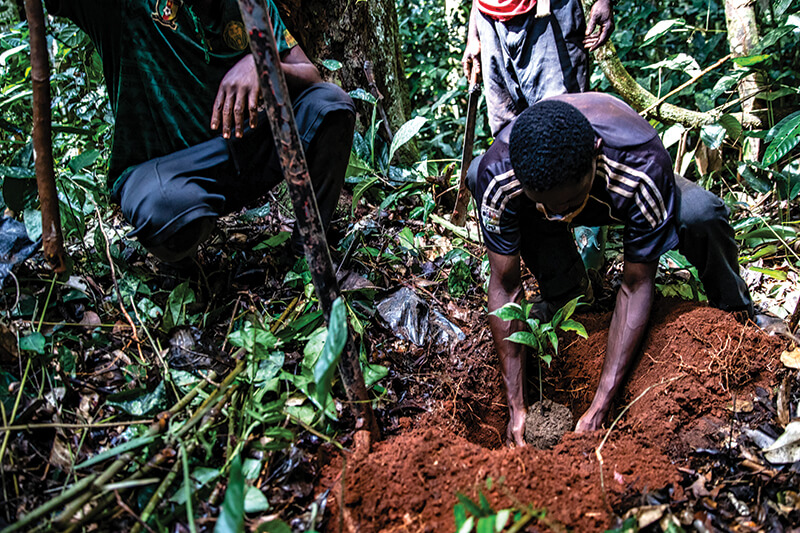
I think people look to the top, to see where their industry is headed. Taylor, as one of those leaders, will have other companies looking to you as a guidepost to see what they should be doing in their own business practices.
All we can do is be an example. And we welcome any other manufacturer – Fender, for example, is doing some pretty cool stuff in this area. We’re not big enough to change the world, but our bully pulpit can allow us to be an example to say, ‘If this little guitar company can do this, so can you.’
For what you’re doing in Cameroon, specifically – is that exclusively for Taylor, or do you supply some of the wood you produce to other manufacturers?
For ebony, the Crelicam mill supplies others, sure. And our partner [Madinter] sells ebony to other people. Regarding the re-forestation, though, just keep this in mind. You, me, everyone we know is going to be dead by the time these trees are big enough to be used. We’re talking about hardwoods that can take between 80 and 100-plus years before they become harvestable. It’s important to understand that what we’ve got going on in Hawaii and Cameroon, we hope to plant thousands and thousands of trees – and we’ll never live to see them cut. We’re not doing it so we can make guitars; we’re doing it so our grandkids can still make guitars.
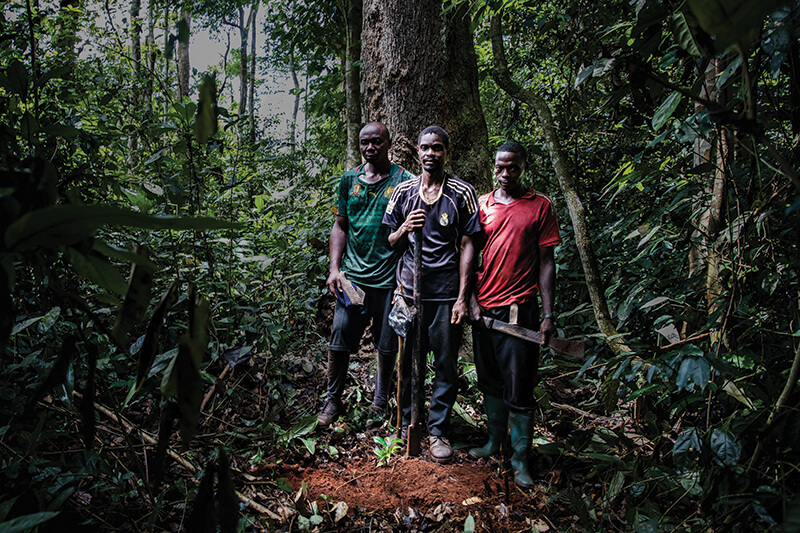
For more information, please visit https://www.taylorguitars.com/ebonyproject
